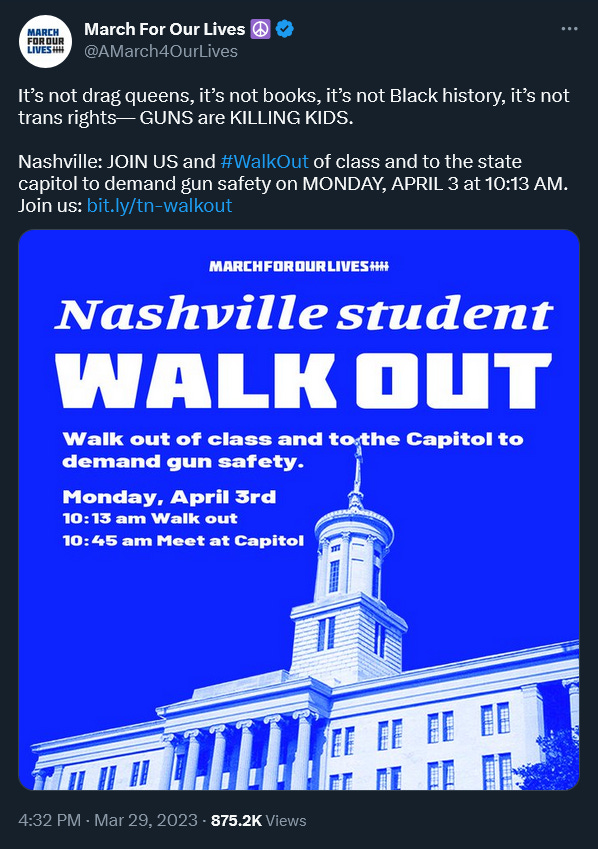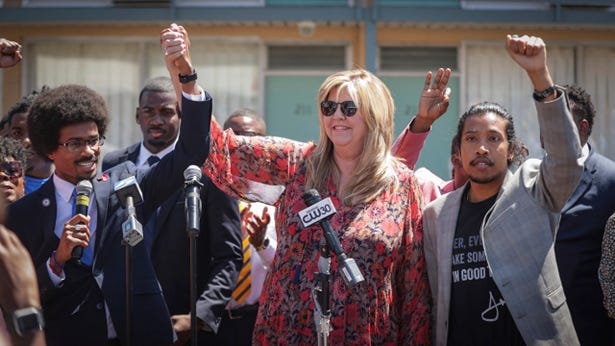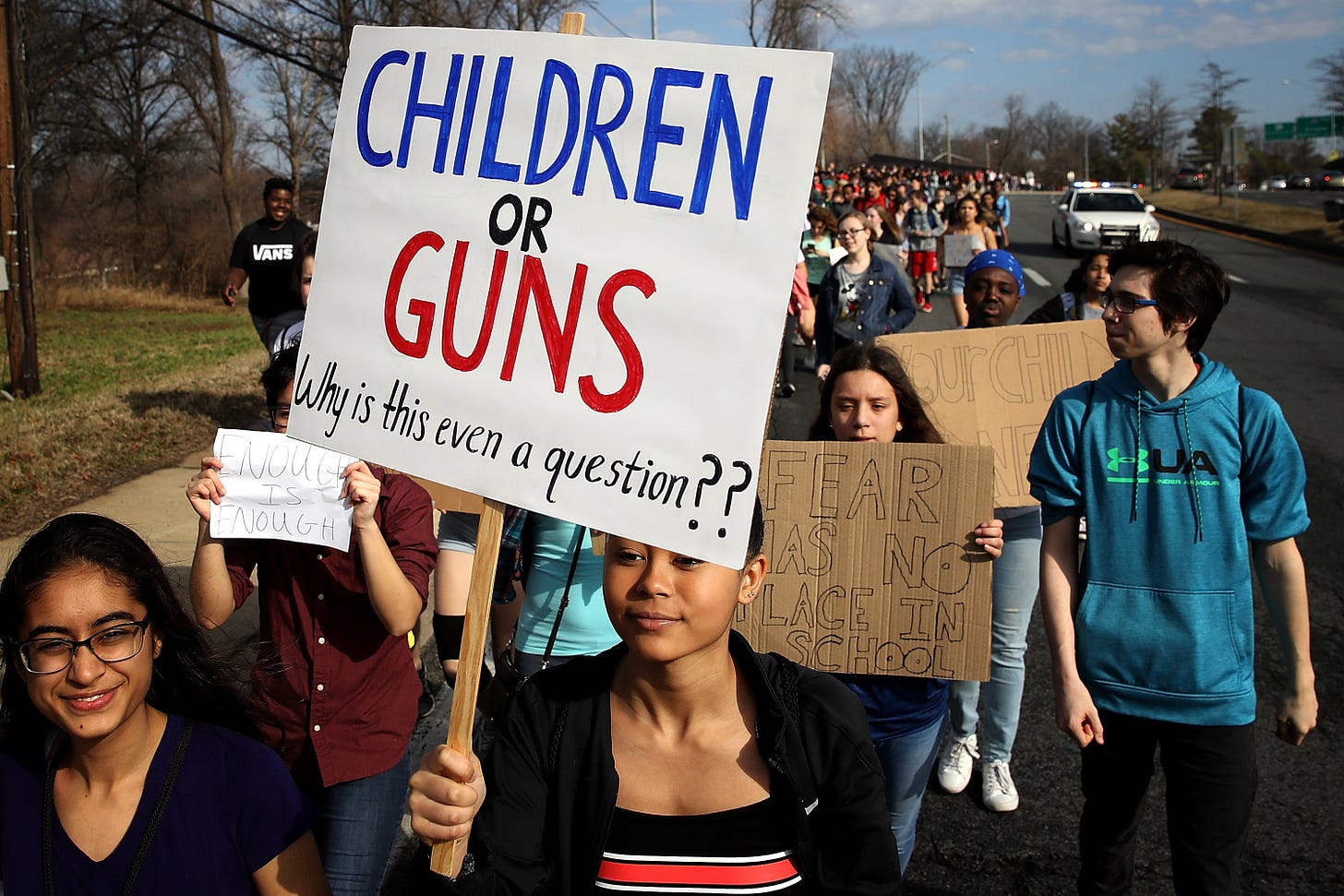“Wisdom is Better Than Weapons of War”
On April 20, 1999, two teenagers murdered 13 people and injured more than 20 others at Columbine High School in Littleton, Colorado. Twenty-four years later, there have been 376 more confirmed school shootings.
At least 623 children, educators, and staff have been killed or injured, and more than 348,000 students have been exposed to gun violence in their schools. Although most school shootings are committed by white perpetrators, Hispanic students are twice as likely to experience campus gun violence. For Black students, the chances increase more than three-fold.
Teenagers are responsible for more than half the country’s school shootings. The median age for school shooters is 16. In cases where the source of the gun used could be determined, 86% came from the homes of friends, relatives, or parents. 91% of school shootings are carried out by current or former students of the affected campus. In addition to research into the negative effects that active shooter drills have on student mental health, there is increasing concern these drills are teaching the next generation of shooters how to pre-plan their attacks and evade security.
The frequency of school shootings has escalated significantly in recent years. Through 2017, the United States averaged 11 school shootings per year. In 2018, that figure jumped to 30. There were 51 school shootings in 2022 alone, more than in any year since these statistics have been tracked. There have been 13 school shootings in the first three months of 2023, the most recent happening on March 27 at a private, Christian elementary school in Nashville, Tennessee.
Although it has the tenth-highest rate of gun deaths in the country, Tennessee does not:
Have a waiting period to purchase a firearm.
Require background checks for private gun purchases or transfers.
Require permits or licenses to purchase or carry firearms.
Prohibit the purchase and possession of semi-automatic assault-style weapons.
Prohibit or regulate the purchase or sale of high-capacity magazines.
Require a permit or training to carry an open or concealed handgun.
Require gun owners to report lost or stolen firearms.
Tennessee also does not:
Have Extreme Risk Protection (“Red Flag”) laws allowing law enforcement to obtain a court order temporarily removing guns from a person at risk of harming themselves or others, and prohibiting the person from buying new guns until the order is lifted.
Require law enforcement to trace the chain of custody on guns recovered from crime scenes to prevent gun trafficking.
Require new handgun models sold in the state to include childproofing technology.
Require a locking device or child-resistant storage for unattended firearms.
Impose a penalty on someone who fails to secure an unattended firearm and leaves it accessible to an unsupervised minor.
Allow towns and cities to enact their own local gun laws in addition to state statutes.
So, what is the Tennessee Legislature doing in response to the deaths of three 9-year-old students and three adults at The Covenant School?
March 27, 2023: When interviewed on the day of the shooting, Representative Tim Burchett (R-2nd District) told a reporter “We’re not gonna fix it.” By contrast, just 20 days earlier, Burchett had spoken in favor of Tennessee’s ban on public drag shows by saying “We don’t put up with that crap in Tennessee…and the rest of the country should follow suit.”
March 29, 2023: Senate Judiciary Chairman Todd Gardenhire (District 10-Chattanooga) announced that no gun-related bills would be taken up during the rest of the current legislative session. He also said he was “embarrassed” that “people with other agendas” wanted to make the Covenant School shooting incident “a political issue and take advantage of a complete tragedy.” Meanwhile, student protestors in Nashville and surrounding towns were coordinating with March for Our Lives and other youth-led organizations to hold walkout protests the at their respective schools, followed by a joint march to the state Capital to demand gun control reform.

March 30, 2023: More than a thousand students, parents, and teachers marched on the state Capitol to demand common sense gun legislation, including an assault weapons ban, red flag laws, and mandatory background checks. The demonstrations progressed from the rotunda, into the galleries, and eventually onto the House floor. Representatives Justin Jones (D-52, Nashville), Justin Pearson (D-86, Memphis), and Gloria Johnson (D-90, Knoxville), who have since become known as “The Tennessee Three,” joined the crowd in chants of “enough is enough,” “power to the people,” and “no action, no peace.” When their microphones were cut off, Representatives Jones and Pearson used a megaphone to address the crowd.
"We don't want to be up here, but we have no choice but to find a way... to disrupt business as normal, because business as normal is our children dying.”
- Rep. Justin Pearson
House Speaker Cameron Sexton (R-Crossville) called the three members’ participation in floor protests “an insurrection” and accused them of trying to “incite riots of violence.” He also dismissed the youth protests inside the Capitol building as a publicity stunt, claiming “their real goal today was to try to be arrested and have pictures of them being walked out by Troopers in handcuffs.” Contrary to Speaker Sexton’s description, the Davidson County Sheriff’s Office reported that while a handful of demonstrators were removed from the gallery, no arrests, deaths, injuries, property damage, assaults on law enforcement officers, or attempts to overturn an election occurred during the Tennessee House protests.
April 3, 2023: State Rep. William Lamberth (R-District 44) told a group of student protestors converged outside his office to again demand a ban on AR-15s and other assault-style weapons:
“It’s not about this one gun. If there is a firearm out there that you’re comfortable being shot with, please show me which one it is. There’s not. There’s not. Right there…you can ban that specific gun and you are going to do almost nothing to improve y’all’s safety. I’m sorry that’s a fact.”
Actually, that’s not a fact. The federal Public Safety and Recreational Firearms Use Protection Act of 1994 banned the manufacture, sale, or possession of certain semi-automatic firearms, as well as large capacity magazines. The Act expired in 2004 in accordance with its 10-year sunset provision. Since then, 44% of mass shootings have involved at least one semi-automatic rifle. Ten of the 17 deadliest mass shootings in the United States since 2012 have specifically involved AR-15s.
Representative Lamberth doesn’t have to ask himself which gun he’d like to be shot with at his workplace. Firearms of all kinds are completely banned from the State Capitol building.
Earlier that same day, the Legislature voted to strip Representatives Johnson, Jones, and Pearson of their committee assignments, and introduced resolutions calling for their expulsion from the General Assembly for “disorderly behavior” that “did knowingly and intentionally bring disorder and dishonor to the House of Representatives.” Republican Reps. Bud Hulsey (District 2-Kingsport), Gino Bulso (District 61-Brentwood), and Andrew Farmer (District 17-Sevierville) filed the resolutions and requested an expedited vote.
April 6, 2023: After hours of often heated debate, the Tennessee House of Representatives voted 72-25 to expel Rep. Jones, and 69-26 to expel Rep. Pearson. Rep. Charlie Baum (District 37-Murfreesboro) was the only Republican out of a 75-seat supermajority who voted against all three expulsion resolutions. When asked why she thought Reps. Jones and Pearson were expelled but she wasn’t, Rep. Johnson said "I'll answer your question — it might have to do with the color of our skin." She expanded her answer in a follow-up interview with CNN:
“Well, I think it's pretty clear. I'm a 60-year-old white woman and they are two young Black men. In listening to the questions, and the way they were questioned, and the way they were talked to… I was talked down to as a woman, mansplained to, but it was completely different from the questioning they got."
Breaches of decorum rules are typically punished by censure or removal from committee appointments. Rep. Bulso said expulsion was necessary in this case because the three Democrats had "effectively conducted a mutiny.” Other Republican leaders said they wanted to avoid setting a precedent that using protests to disrupt House proceedings would be tolerated.
April 10-12, 2023: When House members are expelled, Tennessee law allows local government bodies to appoint interim members to fill those vacancies until a special election is held. On Monday, April 10, the Nashville Metropolitan Council voted 36-0 to reinstate Rep. Jones. The Shelby County Board of Commissioners voted 7-0 to reinstate Rep. Pearson on Wednesday, April 12. Both Jones and Pearson have said they will seek re-election. Tennessee's Constitution does not allow members to be expelled twice for the same offense.

When tragedies strike, the affected state’s governor is expected to respond, preferably with something more substantial than “thoughts and prayers.” Governor Bill Lee waited 36 hours to address the people of Tennessee after the Covenant School shooting. When he eventually did speak, he invoked the God of his evangelical Christian understanding, called upon the people of Tennessee to pray, and spoke of battling the threat of “evil.” He listed the names of the shooting victims and spotlighted his family’s personal connection to Covenant School principal Katherine Koonce. He praised teachers and law enforcement officers for their courage and swift response. He reiterated his belief in the need to strengthen school safety.
He did not say the word “gun.”
Gov. Lee said there would be a time to discuss legislation and policy but did not say when that time would be. He told the people of Tennessee that what happened at The Covenant School was “beyond comprehension.” He told them that “now is not a time for rage.” He could not have been more wrong. The people of Tennessee, including one of Gov. Lee’s own family friends, made it clear they were not comforted or placated by his scripted prayers and patronizing words. The people wanted action.
But instead of calling for any of the gun control measures that thousands of his outraged, grieving constituents marched on the Capitol to demand, Gov. Lee announced on April 3 that he planned to spend $205 million in state tax dollars on an enhanced version of the status quo. Nearly 70% of that money would go toward recurring grants to put armed security guards in all public schools. About 15% would be used to expand the statewide Homeland Security network. Despite common Republican claims that mass shootings are a “mental health problem,” less than 4% would be used to expand the state’s K-12 school-based behavioral health liaison program. Tennessee currently ranks 41st in the nation for youth mental health resources.
To accompany this funding, proposed amendments to joint bills HB0322 and SB0274 will require all public and private schools to submit building layouts and security plans to local law enforcement and conduct annual incident command, armed intruder, and bus drills. Public access to the school must be limited to the main entrance, and all exterior doors must remain locked at all times. State and local law enforcement will conduct random door checks to ensure compliance. Violations will result in losses of between 2% and 10% of certain state funding. Schools built or renovated after July 1, 2023 must have double-entry doors at the main entrance, interior lock mechanisms on all classroom doors, continuous security camera monitoring in each entrance, hallway, and communal area, and bullet-resistant film on the glass of every exterior entry or basement level window and door. All school districts are also encouraged to implement a mobile panic alert system. Gov. Lee is expected to sign these bills into law before the end of the month.
On April 11, Gov. Lee issued Executive Order 100 requiring all domestic violence convictions, orders of protection, mental health adjudications, and other disqualifying history to be entered into the state’s instant background check database or reported to the State Bureau of Investigations within 72 hours. The Tennessee Firearms Association immediately criticized the order as an attack on Second Amendment rights. Gov. Lee also asked the Legislature to create a new “Order of Protection” bill that would serve the same basic function as a red flag law, just under more palatable title. When asked who was working on drafting that bill, Republican lawmakers refused to provide any names and said, “There is no legislation.” Rep. Gloria Johnson, whose own attempts to introduce a similar law were voted down in 2021 and 2022, said “They’re welcome to use my legislation, and they can put anybody’s name on it they want, and just pass it…I don’t care what they call it. Let’s call it the Saving Tennessee Children’s Act. And let’s pass something now.”
Tennessee Republicans have apparently declined that offer, choosing instead to bring HB1202 out of committee for discussion on the House floor this week. If passed, HB1202 would allow K-12 and college faculty or staff to carry concealed handguns on their school campuses, including into classrooms, without having to disclose that information to students, parents, or coworkers or obtain permission from the school’s principal. School districts would be immune from claims of monetary damages related to the employee’s use or failure to use their handgun. The bill would NOT exempt staff or faculty members from any related criminal or civil penalties, or from the emotional toll of injuring or killing one of their own students.
As mass shootings have become more common, there’s been an increasing amount of talk from Republican politicians, right wing pundits, and people who got their military training from playing Call of Duty about “hardening” our schools against the escalating threat of gun violence: Lock the doors and arm the guards. Reduce the entry points and reinforce the glass. Patrol the hallways and monitor the cameras. Practice the lockdown drills. Run, hide, fight. Ignore the latest youth mental health statistics about depression, anxiety, and suicidality. The kids can handle it.

Studies have shown that armed school resource officers disproportionately increase the suspension, expulsion, and juvenile incarceration rates for Black and disabled students while doing nothing at all to decrease the number of school shootings. In fact, having armed SROs is more likely to make the situation worse. An armed officer on scene is the second-most common factor associated with increased casualties behind the use of assault-style rifles. Columbine High School had a sheriff’s deputy working as an armed school resource officer at the time of the shooting. Parkland, Santa Fe, and Uvalde all had armed SROs on site. Sixty-two people were still murdered and at least seventy were injured, just in those shootings.
Developing comprehensive safety plans and sharing building layouts with emergency responders makes sense to me for a number of potential situations. I can even accept locked doors and security camera monitoring. But when I think of a heavily secured facility with armed guards, I don’t imagine a school. I picture a prison for the innocent.
When I think of school districts allowing teachers to carry concealed handguns but not to choose their own books and curricula, I see more dead and traumatized students and more educators leaving the profession. I see legislators who are more upset about losing votes and endorsements more than they are about the deaths of other people’s children. I see a society that uses weapons of war to silence the wisdom it fears. I see white supremacy and Christian Nationalism in action.
A school is a place designed for educating students. A target is something marked as the aim of an attack. A “hardened” target may be more difficult to hit or damage, but it is still, by definition, a target. Treating unrestricted gun ownership like a divine, inalienable right turns schools into targets and hardens the idea that mass shootings cannot be prevented and must simply be endured. Our goal should not be to increase the odds of survival. Our goal must be to eradicate the threat.
We will not do that by calling the problem incomprehensible or unfixable. We will not do it by continuing to parrot NRA talking points. We will not do it by turning our schools into armed fortresses while ignoring the fact that mass shootings happen in nearly every other location where a child could be present. We will not do it if we continue to be the only nation among our peers to refuse to see what’s bleeding out right in front of us:
It’s the fucking guns.



